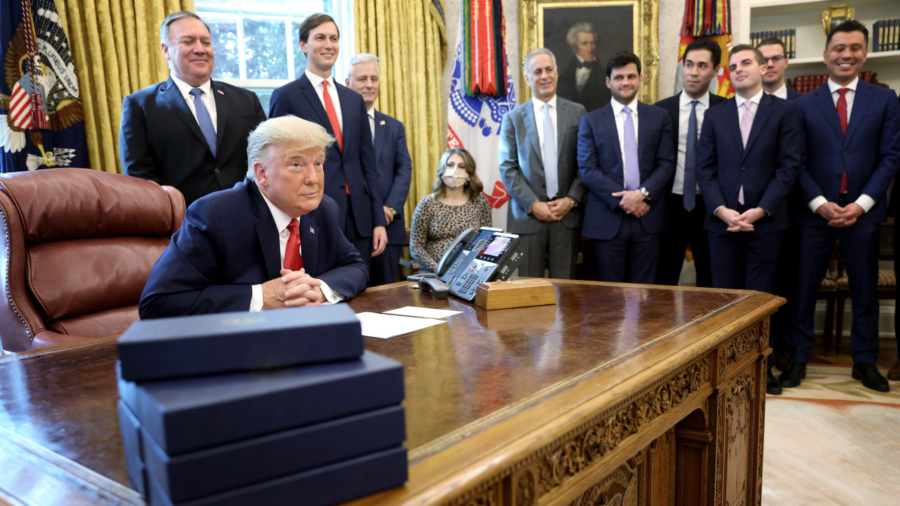Israel and Sudan agreed on Friday to take steps to normalize relations in a deal brokered with the help of the United States, making Khartoum the third Arab state to set aside hostilities with Israel in the last two months.
U.S. President Donald Trump sealed the agreement in a phone call with Israeli Prime Minister Benjamin Netanyahu and Sudanese Prime Minister Abdalla Hamdok and Transitional Council Head Abdel Fattah al-Burhan.
“The leaders agreed to the normalization of relations between Sudan and Israel and to end the state of belligerence between their nations,” a joint statement issued by the United States, Sudan, and Israel.

Trump invited reporters into the Oval Office while he was on the phone with the leaders of Israel and Sudan. “This is one of the great days in the history of Sudan,” Trump said, adding that Israel and Sudan have been in a state of war for decades.
“It is a new world,” Netanyahu said over the phone. “We are cooperating with everyone. Building a better future for all of us.”
The deal also is aimed at unifying Arab countries against their common adversary, Iran.
“The United States will take steps to restore Sudan’s sovereign immunity and to engage its international partners to reduce Sudan’s debt burdens, including advancing discussions on debt forgiveness consistent with the Highly Indebted Poor Countries Initiative,” the joint statement said.
Both the United States and Israel will assist Sudan “in strengthening [its] democracy, improving food security, countering terrorism and extremism, and tapping into [its] economic potential,” the statement said.
Sudan and Israel will establish trade and economic relations with “an initial focus on agriculture.” Within the coming weeks, the delegations will meet to negotiate further cooperation in various areas including agriculture technology, aviation, and migration issues.
Abraham Accords
Sudan will become the third country to normalize its ties with Israel under the United States-brokered agreement. On Sept. 15, the United Arab Emirates and Bahrain signed in Washington, their normalization accords with Israel, called Abraham Accords.
The deal will normalize the commercial, security, and diplomatic relations of both countries with Israel.
Before two Arab countries fully normalized their relations with Israel, Egypt in 1979 and Jordan in 1994.
The success in brokering the Abraham Accords owes to President Donald Trump’s different approach from the common understanding on how “how to create security for the Middle East,” U.S. State Secretary Mike Pompeo said in an interview in September.
“The Trump administration recognized that “that the central challenge in the Middle East wasn’t the conflict between Israel and the Palestinians, but rather the challenge that is presented by the Islamic Republic of Iran and their anti-Semitic terrorist campaign all around the world,” Pompeo explained.
Revoking Sudan’s Status as State Sponsor of Terrorism

President Donald Trump has told the U.S. Congress he would rescind Sudan’s designation as a state sponsor of terrorism, the White House said on Friday, after Sudan transferred $335 million into a special escrow account for U.S. victims of terror and their families.
“President Donald J. Trump has informed Congress of his intent to formally rescind Sudan’s designation as a State Sponsor of Terrorism,” the White House said in a statement. “This follows on Sudan’s recent agreement to resolve certain claims of United States victims of terror and their families.”
Trump achieved “the resolution of longstanding claims of victims of the East Africa embassy bombings, the attack on the USS Cole, and the murder of USAID employee John Granville,” something that his predecessors were not able to accomplish, the statement said.
“It is essential that Congress act now to pass the legislation required to ensure that the American people rapidly realize the full benefits of this policy breakthrough,” the White House said.
The removal of the terror designation opens the door for Sudan to get international loans and aid needed to revive its battered economy and rescue the country’s transition to democracy.
Sudan is on a fragile path to democracy after a popular uprising last year led the military to overthrow the longtime autocrat, Omar al-Bashir. A military-civilian government rules the country, with elections possible in late 2022.
Many in Sudan say the designation, imposed in 1993 because Bashir’s government was supporting several international terrorist groups such as Hamas, Lebanese Hezbollah, and others, has become outdated since Bashir was removed last year.
Reuters and The Associated Press contributed to this report.
From The Epoch Times

